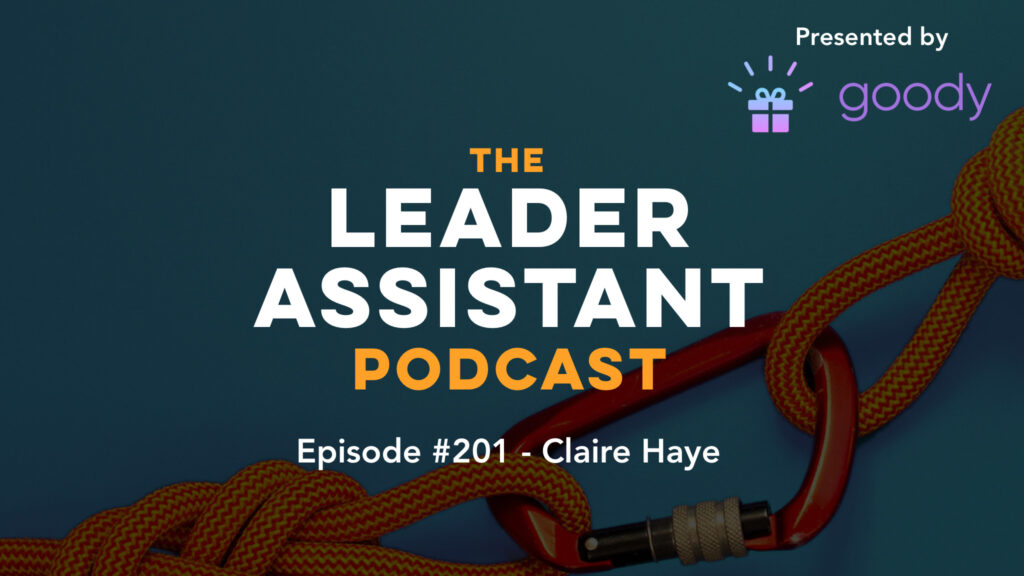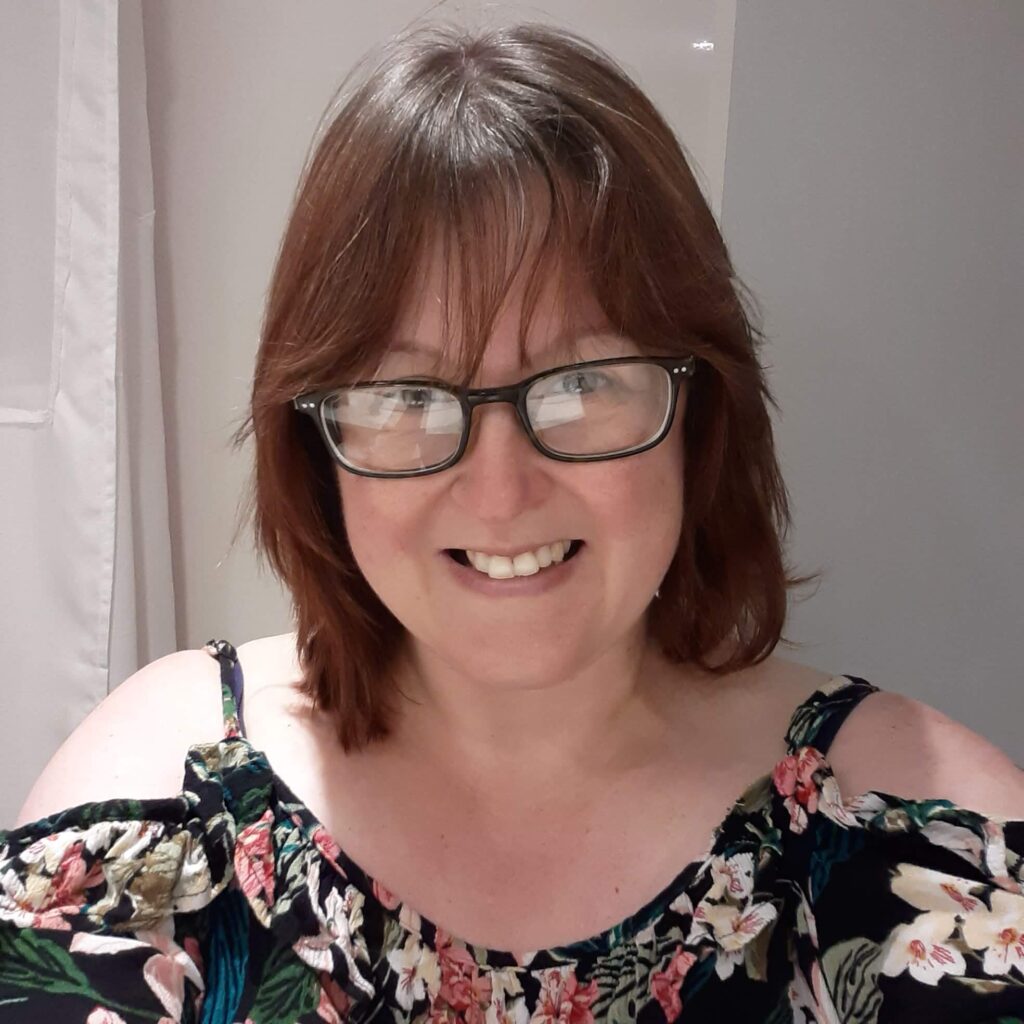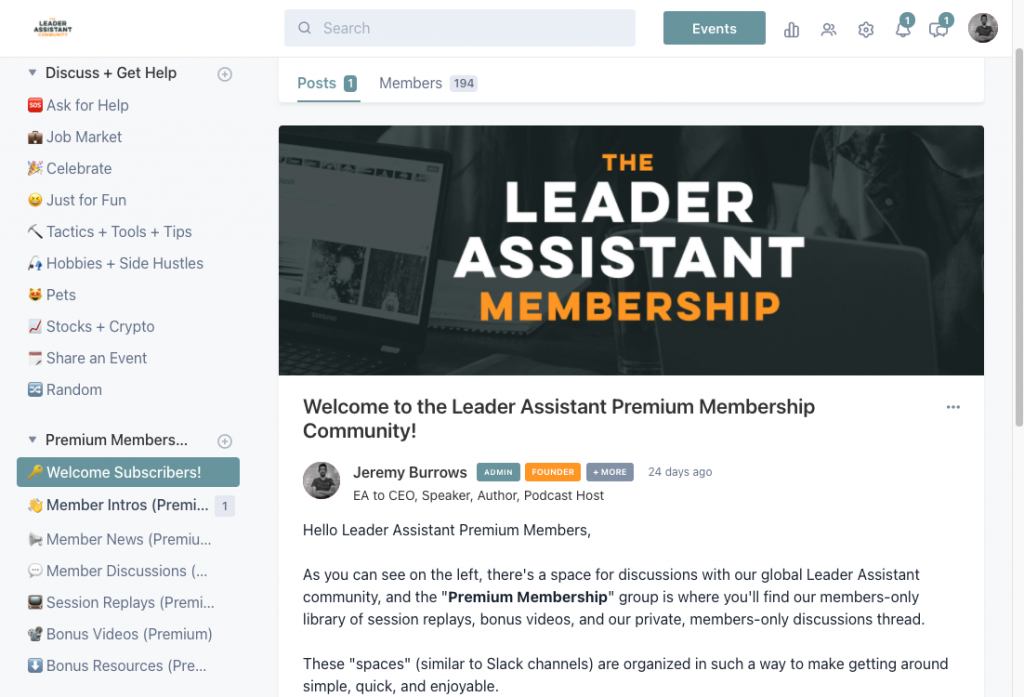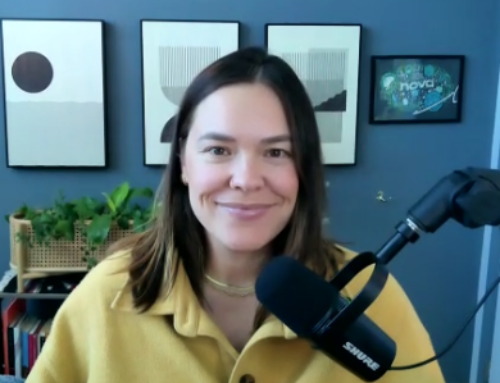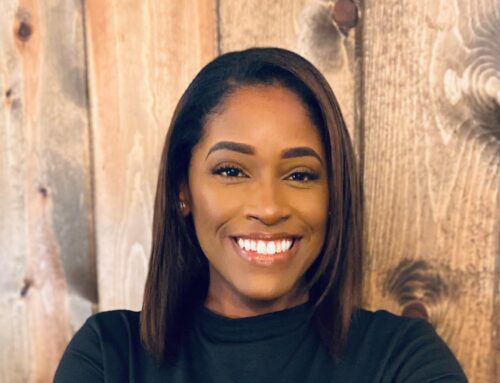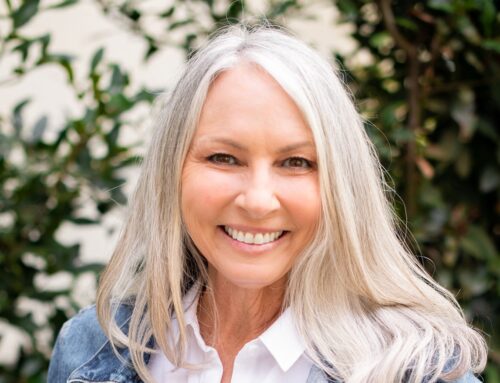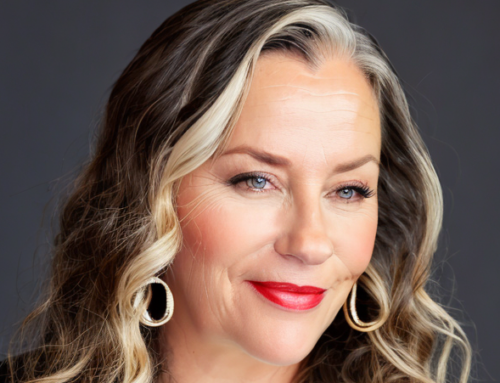Claire Haye has worked in the public sector for a local council, profit for purpose within Social Housing and now in the private sector at Amazon. She has been in roles where she is the only Assistant but also led a team of more than 80 people.
In this episode of The Leader Assistant Podcast, Claire talks about owning your career, building your personal brand, and emotional intelligence.
LEADERSHIP QUOTE
Your smile is your logo, your personality is your business card, how you leave others feeling after having an experience with you becomes your trademark.
– Jay Danzie
CONNECT WITH CLAIRE
ABOUT CLAIRE
Claire Haye started her career as an Office Junior at 18 having worked in retail already for 5 years. She has had many job titles, some by choice and some due to restructures and redundancy. Claire has worked in the public sector for a local council, profit for purpose within Social Housing and now in the private sector at Amazon. She has been in roles where she is the only Assistant but also led a team of more than 80 people. To say her career has been varied would be an understatement, but like all in the Professional Services sector every day brings surprises and new challenges.
Claire’s current passion is the development of others through her mentorship and facilitation of IamRemarkable workshops.
THE LEADER ASSISTANT PODCAST IS PRESENTED BY GOODY
A special thanks to my sponsor, Goody!
If you send business gifts to employees, clients or sales prospects, Goody is a game changer. You can send one gift or hundreds at the same time, without ever worrying about shipping details. With Goody, your gift recipients provide all their shipping info, and they can even swap out your gift for another option if they prefer. It’s free to start gifting and you get a $20 credit when you sign up. Oh and if you mention you heard about Goody on The Leader Assistant Podcast, Goody will add an extra $10 credit to your account.
Go here to start gifting today!
THE LEADER ASSISTANT PREMIUM MEMBERSHIP
To learn more about how you can join growth-minded Leader Assistants, check out our Leader Assistant Premium Membership for ongoing training, coaching, and community.
THE LEADER ASSISTANT BOOK
Download the first 3 chapters of The Leader Assistant: Four Pillars of Game-Changing Assistant for FREE here or buy it on Amazon or Audible.
LEADER ASSISTANT LIVE EVENTS
Check out our constantly updated schedule of events for admins and assistants at LeaderAssistantLive.com. Including our all-day, online leadership workshop at leaderassistantlive.com/workshop.
JOIN THE FREE COMMUNITY
Join the Leader Assistant Global Community here, or the Facebook Group here for bonus content and to network with other assistants who are committed to becoming leaders!
SUBSCRIBE
Subscribe to The Leader Assistant Podcast so you don’t miss new episodes!
You can find the show on Apple Podcasts, Spotify, Google Podcasts, Pandora, and Stitcher.
Join my email list here if you want to get an email when a new episode goes live.
LEAVE A REVIEW
If you’re enjoying the podcast, please take 2 minutes to rate and review the show on Apple Podcasts here. Each review helps me stay motivated to keep the show going!
—
EPISODE TRANSCRIPT
Claire Haye 0:00
Hi this is Claire Haye, today’s leadership quote comes from Jay danzi Your smile is your logo your personality your business card. How you leave others feeling is your trademark.
Podcast Intro 0:18
The Leader Assistant Podcast exists to encourage and challenge assistants to become confident game changing leader assistants
Jeremy Burrows 0:34
The Leader Assistant Podcast is exclusively brought to you by goody which provides effortless gifting for all occasions. If you’re tired of sending tacky impersonal business gifts, then you should definitely check out goody my friends at goody offer a collection of hundreds of curated brands like Levain bakery, Thera body, milk bar, and Ember mugs. With goody, if your recipient doesn’t like your gift, they can swap it out for one they do like you can find perfect gifts for any occasion. Whether it’s work anniversaries, birthdays, new hire onboarding or company swag. It’s free to start gifting and you get a $20 credit when you sign up. Also, be sure to mention The Leader Assistant Podcast when signing up and goody will add an extra $10 credit to your account. So go to leaderassistant.com/goody to disrupt the inefficiencies in your team’s gifting strategy. Again, that’s leaderassistant.com/goody Hey friends. Thanks for tuning in to The Leader Assistant Podcast. Welcome to Episode 201 You can check out the show notes at leaderassistant.com/201. Leaderassistant.com/201. Today I’m excited to be speaking with Claire Haye. Claire works at Amazon UK as a assistant to General Manager and Claire, how’s it going today? Yeah, really well, thank you. What part of the UK Do you live in?
Claire Haye 2:15
So I live in the East Midlands, so bang in the middle of England on the east east coast. So yeah, working in their sort of Derbyshire Nottinghamshire Leicestershire area.
Jeremy Burrows 2:29
Are you from that area?
Claire Haye 2:32
No, I’m originally from the south UK. So I’m from the south coast from a place called Weymouth in Dorset. So I moved up exactly 10 years ago today.
Jeremy Burrows 2:42
Nice nice. And tell us a little bit about before we jump into your career about you personally do Are you a dog person? Are you a cat person? Are you a hobby person? What’s what’s a little bit about Claire?
Claire Haye 2:55
Yeah, probably my biggest thing is music. So I love music. I go to lots festivals, lots of live bands, big names sort of local bands. So yeah, I really love to go out and listen to live music, which, since COVID, I’m now sort of trying to get to as many gigs as I can, because there were so many canceled and not on.
Jeremy Burrows 3:17
Yeah, what’s one of the best live music performances you’ve ever been to?
Claire Haye 3:23
Um, I think one of the most energetic was Queen, but with Adam Lampard, sadly, I never never saw Freddie. But yeah, queen with Adam Lampard was was an experience. Definitely.
Jeremy Burrows 3:37
That’s great. Well, all right. Tell us about professionally, then what brought you into the Administrative Professional assistant world? How’d you end up as an assistant and tell us a little bit about your story?
Claire Haye 3:52
So when I left sick form college at 18, I decided I didn’t want to go to university. I didn’t think I could afford it. At the time. None of my family had ever gone to university. So it was time to find a job. My first I’d been working retail since I was 13. But my first kind of adult job was as an officer system, very old fashioned company. The men sat up on the first floor, the lady sat on the ground floor. Yeah, so that was quite an experience. And then from there, I moved into local authorities so working for public sector through various roles, so admin assistant, senior training administrator, Secretary, office manager, and then I moved up north and took on back to a PA role. And again, that went through several changes. At one point I was the facilities manager. And then I got made redundant so I I took that time to kind of refocus what I wanted, what I wanted, what I liked about the roles I’d had and what they didn’t. And that’s when I went from my current role at AMS. And
Jeremy Burrows 5:13
what’s been your favorite part about being an assistant?
Claire Haye 5:19
For me, it’s the variety. So I could literally, you know, you never know that that one line emails gonna put in your day that you weren’t expecting, so you can have a lovely to do list. And then somebody’s you know, a few sentences, suddenly, your whole days spins on its axis, and you’re you’re doing stuff you never never imagined you could. And I think as well, for me, it’s, it’s the being being able to help other people reach their goals. So I think I’m very much of the opinion that I’m there to support the people in my team so that they can do what they do really well.
Jeremy Burrows 6:03
Yeah, well said, well said, What about your least favorite part?
Claire Haye 6:07
My least favorite part is pocket expenses. I just hate hearing expenses. Know, I constantly I’m like, why every week, I’m just going to do do them a week at a time, chip away at it, and then it gets there in two months. And I’m like 100 sought out all these receipts. Yeah,
Jeremy Burrows 6:25
I hear you on that one. Well, let’s talk a little bit about a few of the topics that you would mentioned, you’d like to chat about first one being owning your career, what what has that meant to you? What does it mean to you to own your career?
Claire Haye 6:42
So I think for me, a lot of the roles I’ve had have sort of happened to me. So I’ve there’s been a restructure often. So particularly in the UK, in the public service world, in your your councils in a local authority level, restructure sort of every two, three years. So I found myself going into roles that were getting further and further removed from what I actually went in that business to do. And the bits of the role that I love. As I say at one point, I was a I went from an PA to an office manager to a facilities manager. And at that stage, I was looking after everything from electricity contracts, mobile phone contracts, fleets of vehicles, things that just weren’t really weren’t really my bag, they weren’t really using my skill set. So I’m very much an advocate of knowing what you want from a role, what you’re good at where your superpowers are. And going after that, and actually not being afraid to say this isn’t the role for me, or this isn’t the company for me. And proactively looking. I think, very often we can end up in roles we don’t like or just don’t suit us. But we keep thinking it’s going to change. And I think sometimes you’ve just you’ve just got to be brave and take that, take that step.
Jeremy Burrows 8:12
Tell us about a time that you that you were brave. And you did take that step. And tell us how that how that turned out. Because I know a lot of people listening are like, I don’t know, I don’t know, if I you know, I don’t want to risk it, you know?
Claire Haye 8:25
Yeah, so I think for me, it started really small. So I did a basic SWOT analysis. So what were my strengths? What are my weaknesses? Where will where my where my opportunities in the business I was in at the time? I think sometimes people think, Oh, you have to eradicate every single weakness you’ve got. And that’s, that’s never gonna happen. We’re humans, we’re not robots, you can’t sort of delete that coding and make yourself something you’re not. So I think it’s finding the roles that play to your strengths. And that your weaknesses, on an on an impact don’t have an impact on them. Rather than trying to make yourself the expert in every single area. And one of the things I did was I looked at where did I want to get to and what were my gaps in knowledge or what were my gaps in education, and I got my employer at the time to fund my degree so that I could keep working full time because we’ve all got bills to pay and get my degree that I knew I would need going forward for the career I wanted, even though wouldn’t necessarily be with that company.
Jeremy Burrows 9:41
What was the degree? So
Claire Haye 9:43
business business management? Okay, awesome.
Jeremy Burrows 9:47
Awesome. Well, let’s talk a little bit about mentoring. What’s been your experience as a mentee or as a mentor?
Claire Haye 9:58
Yes, I’ve been based I’ve been As a mentee within the business I’ve worked in, but I’ve also mentored others in my business in my peer group, and outside of my organization. So it’s something I’m really passionate about, I think it’s, there’s always a bit of a gray area between what’s a coach and what’s a mentor. I think for me, I see mentoring as a bit more hands on assisting somebody to achieve a goal. So giving, giving ideas, helping them work through problems, sharing my expertise of what what I’ve done in my sort of 20 plus years, and what’s worked and what hasn’t worked. And really helping helping them achieve a particular goal or project.
Jeremy Burrows 10:52
Awesome. What do you what would you recommend as far as those listening that would, you know, maybe they want to be a mentor, or they want to find somebody to mentor them? Do you see it as more of a casual informal setup originally? Or is it? Is it more like, hey, you know, like, hey, let’s have a chat or Hey, be my mentor.
Claire Haye 11:13
Yeah, I think I think it depends on where you work. I think a lot workplaces tend to have mentoring schemes. Also, particular forums can have mentoring schemes. So I think there are there are lots of places where you can you can reach out for many years. But it may, it may be a colleague you’ve previously worked with, it may be a friend, it may be somebody that actually you’re, for instance, following on LinkedIn, or a social media platform. And you just really like what they do and how they do it. So what what can start as a chat can kind of evolve into mentoring. So I think don’t ever be afraid to reach out to somebody and ask and say, Look, this is this is the situation I’m in this is where I’m trying to get to any pointers, and that that can evolve a relationship into a mentoring. I’ve also found so after I was made redundant, I did a course called Iron remarkable, which is a Google initiative. And I’m now an iron remarkable facilitator. So I’ve facilitated about 22 sessions about just over 200 people I’ve facilitated the iron remarkable program for. And I find that although it’s only a couple of hours, it’s almost like a mini mentoring session. Because people are sharing lots with you, they they’re talking to each other, they’re getting advice from each other. And it creates groups that then continue to stay in touch with one another.
Jeremy Burrows 12:53
How, what’s the, what’s maybe one example? Do you do these in small groups? Do you do them one on one?
Claire Haye 13:01
So we tend to do in groups of about about eight to 10? There is there is an element of discussion and sharing. And I think if you go too small, you don’t you don’t get that. But again, if you go too big, then not, you know, not everybody will have their say, and it can be too intimidating for some people. If if you send me go on to something and there’s like 20 people there and you’re expected to share. So yeah, around sort of eight to 12 people is a good number.
Jeremy Burrows 13:31
Nice. And another topic that was interesting. You said build your personal brand. What do you mean by personal brand? And what do you mean by building your personal brand? Because personal brand can kind of be a lot of different things these days, like, oh, you know, you gotta have your social media profile, and you got to this, but sometimes it can just mean, how you present yourself. So what do you mean by that?
Claire Haye 13:54
So I think for me, my personal brand, that there’s sort of two elements, there is the the social media side, so there’s looking at, do the things I follow fit with my values fit with my goals? You know, am I cutting out things that don’t serve me? So, you know, is there is there anything social media wise, that actually it has a negative impact on me when when I’ve, you know, maybe a particular person’s post, they great me or they can, you know, they’re not, they’re not good for you. So it’s cutting some of that out and actually, you know, knowing what, what motivates you and what you feel confident engaging in. So, for instance, through LinkedIn, I’ve, I’ve had a real sort of sort through of who I’m linked to who I follow, looking at how often I post what my posting, and through that I’ve reached out to our East Midlands, Pa For him, and I’m now recently joined their committee for their pa Awards next year, which I don’t think I would have done if I hadn’t been doing that work on social media and looking at looking around at who locally to link in with. And then I think the second part is around your personal brand in your day to day interactions with the people, you, you, you work with, sort of as my quote said, that kind of how you leave people feeling as your trademark. So what we do things like 360 degree feedback, so what do people How do you leave people feeling? How what are your skills? What do you want to be the subject matter expert in? Yeah,
Jeremy Burrows 15:49
that’s great. And then how has that helped you? How’s your personal brand helped you with just professionally with your relationship with your executives and your colleagues and maybe even career path wise, like, when you go into your performance review, and you ask for a raise and all that fun stuff?
Claire Haye 16:13
Yeah. So I think I think your your personal brand does help, I think, in terms of personally, it’s opened doors for me, like I say, with the East Midlands pa forum. So it’s, it’s got me into that. And I’m going to be working with a group of amazing people locally, who are working in the executive support field that I would never have otherwise known about, I would never touch base with. And I think as well, it, it helps you to reinforce what your what your worth is, and what your skill set is. I think very often, particularly in in sort of PA executive assistant roles, we’re often the only person in our building, or sometimes our business that does that job. And we’re very good at doing things under the radar. And we’re not always very good at banging our drum and shouting about what we do. So sometimes the people you’re working with, the only thing they see, or they know about your role is what they physically see you doing. And there’s probably 80% of your job that no one knows you do. But if you stopped doing it, they’d all suddenly realize. So I think it’s about talking about your achievements, and keeping track of those achievements. Because time goes so quickly. We forget what we did. We forget what we got done and what we achieved. And often it’s not until appraisal time or you know, when you’re going for an interview. That’s only you have to think of what what have I done? What’s my experiences? So I think keeping regular track of them, and not being afraid to put your hand up for things that you know, fit your skill set, but other people might not realize you have that skill set?
Jeremy Burrows 18:01
Yeah, I like how you said that. I think it’s important for us all to keep track even document the accomplishments we’ve had personally and professionally. Even just writing down like, alright, what are we good at? What do we what do we bring to the table and just building your personal brand is often directly tied to your confidence, you know, you’re building your confidence as well. So that’s awesome. Okay, what about let’s talk about emotional intelligence. So you mentioned, you know, your strong advocate, that, you know, alongside the hard skills of email management, and task management and communication and all the fun things that we do as assistants, we definitely need emotional intelligence. And I’ve written about this in my book as well. So I’d love to hear your thoughts on what’s emotional intelligence and how do you cultivate and develop your emotional intelligence?
Claire Haye 19:02
Yeah, I love the book, by the way, and I think the term emotional intelligence, I think, is quite a new thing. It’s certainly not something I remember hearing anything about, towards the start of my career. I think it’s always been around the technical skill. So you know, can you do your expenses? Can you manage your your inbox, but I think, often, you know, as a as a sole role in a building or business, you can only achieve by getting stakeholders on board. And that needs a slightly different skill set. You know, you need to be able to negotiate, you need to be able to sometimes have difficult conversations, but also actually get people on board is stakeholder management. And that takes a different skill set than say doing your expenses. So I think there’s a lot of things that Do you learn through experience but again, with the mentoring by sharing those experiences, you can help other people. So how to influence others how to, you know, listen actively and with with empathy. I think there’s a lot of people skills that, you know, in our executive assistant pa roles, we need to get things done because we can’t do everything solely on our own. Yeah,
Jeremy Burrows 20:32
well, what’s what’s one thing that you would tell? Do you go back in time and tell your younger, new fresh assistant career? Self? What what’s one thing you would tell yourself?
Claire Haye 20:49
That no isn’t a bad word. Sometimes. I think as a, I say, a reforming people pleaser, so I’m trying to be less. But I think by nature, a lot of us in this sector tend to be people pleasers, it fits in with our need to help others. And I think sometimes I’ve tied myself up in knots with that by saying yes to this person, yes to that person. They will merrily go on their way. And suddenly, I’ve got 20 projects that I need to deliver by 9am tomorrow morning. I think by saying no, I can own what I take responsibility for and I’m not having to tame other people’s chaos. So very often, I think in in certainly in my career experience in professional services. Other people’s urgencies other people’s emergencies tend to be because they’ve left something so long. So they probably had two or three weeks when they got that task. They’ve left it and now suddenly, with 48 hours to go, it’s an emergency and it’s your problem. So I think I would certainly advocate for my younger self to said no more, and to have drilled down a little bit on Okay, well, we’ll get this done. But let’s let’s learn from this. And let’s not repeat this. So why did it go to the wire? Why did it not happen? You know, when it should have happened?
Jeremy Burrows 22:25
Well said good advice. And I know I, I spoke with an assistant the other day who has been an assistant for about three months. And then I spoke with one I think it was last week. That’s been an assistant for about three weeks. So hopefully they’ll listen and take heed to your advice. It’s great, great tips. Claire, thank you so much for being on the show and sharing a little bit about your journey. I know it’s late in the UK right now. And so I appreciate you taking time to do this, what were some where’s the best place for people to reach out if they want to say hi, and connect with you.
Claire Haye 23:01
So the platform I’m probably most active on is LinkedIn. So that’s, that would be the best place to reach out to me.
Jeremy Burrows 23:09
Awesome. Well, I will put your LinkedIn URL in the show notes and leaderassistant.com/201 Leaderassistant.com/201 Claire, thanks again. Best of luck to you and I really appreciate you reaching out and taking a risk to be on the show and I’m glad it worked out.
Claire Haye 23:32
Thank you very much. Thank you for having me.
Unknown Speaker 23:44
Please review on Apple podcasts.
Unknown Speaker 23:54
Goburrows.com

